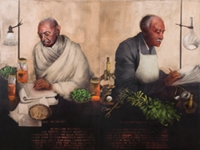Search
By Amb. Kenneth M. Quinn
Published in The Des Moines Register
Sept. 5, 2014
 |
| This painting depicts George Washington Carver and Mahatma Gandhi writing to one another, and is displayed in the World Food Prize Hall of Laureates. By artist Mary Kline-Misol. |
India's Independence Day was Aug. 15, and it seemed to pass without much notice here in Iowa. That was too bad, because there is a remarkable, if little known connection between our state and India's quest to throw off colonial rule, and this connection deserves to be acknowledged and even celebrated.
In 1929, Mahatma Gandhi and the National Congress Party made the fateful decision to begin the quest for total independence. At the same time, Gandhi, a vegetarian, became concerned whether he would have sufficient strength for what promised to be a long, hard slog. Eager to increase the nutritional content of his diet, Gandhi sought to contact a scientist in America, whose name he did not know, but whose studies on nutrition could be the source of valuable advice.
That scientist was George Washington Carver, then a faculty member at Tuskegee Institute in Alabama. But Carver had attained his advanced degrees only because of Iowa.
Carver had been born into slavery in Missouri. Emancipated at the end of the Civil War, he desired to attain a college education but was turned away from schools in several other states because of the color of his skin.
Eventually, Carver ended up in Winterset, where he was making a living by doing laundry. Befriended by a family, he was encouraged to attend Simpson College where he studied art. (Carver was an exceptional artist, and some of his work was exhibited at the Columbian Exposition in Chicago in 1893.) His art teacher at Simpson, a woman named Etta Budd, saw in Carver some scientific potential and encouraged him to apply to Iowa State College, now Iowa State University, where her father was a professor of horticulture.
When Carver ventured to Ames in 1889, that school had never admitted a black student, and probably could have easily turned him away as other colleges had. However, to its everlasting credit, Iowa State admitted him, and over the next six years, Carver earned a bachelor's and master of science degrees in horticulture and became a faculty member.
Carver would have, no doubt, stayed at Iowa State for the rest of his career, but he could not refuse the call of Booker T. Washington to go to Alabama and join him on the staff of Tuskegee Institute, whose mission was to educate the large number of young black students in the South. It was there that Carver would become one of America's greatest agricultural scientists of the first half of the 20th century.
And it was there that the first letter from Gandhi would reach Carver in 1929 and would lead to a correspondence that would continue at least through 1935, and perhaps beyond.
I only became acquainted with this historic relationship by chance when a young Iowa State graduate named Paxton Williams visited me in 2005. Williams was working at the Carver birthplace memorial in Missouri.
When I mentioned that our new World Food Prize laureate was from India, Williams told me that his archives had copies of letters exchange between Gandhi and Carver. I jumped out of my chair telling him that I had to have copies of them, which he subsequently sent to me.
In reading them, suddenly this exchange between two men who had never met, came to life. In his letters addressed to "My beloved friend, Mr. Gandhi," Carver provided advice about adding additional soy in his diet and other ways to enhance nutrition.
I became so enamored of this story and felt that it deserved to have a place in Iowa's humanitarian and agricultural history, that I commissioned a painting by the wonderful Des Moines artist Mary Kline-Misol, which now hangs in the Iowa Gallery at the World Food Prize Hall of Laureates.
When I show it to visitors, I usually tell them that in Washington, D.C., directly across the street from the White House is Lafayette Park, created as a tribute to those foreigners who played an instrumental role in America's obtaining our independence.
It therefore should be a considerable point of pride that our state of Iowa, played a small, but perhaps not insignificant, part in India's quest for independence, which culminated on Aug. 15, 1947.


